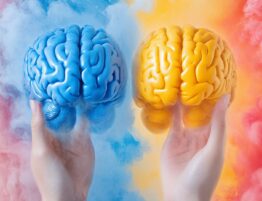Your brain constantly sends chemical messages affecting your thoughts, feelings, and behavior. These messages rely on special molecules called neurotransmitters. When you experience neurotransmitter levels and stress, these chemical messengers can become severely disrupted.
Think of your brain as a bustling city with millions of workers (neurons) sending messages through chemical highways. How stress affects brain chemistry is like a massive traffic jam, disrupting this complex communication system. This disruption can affect mood, sleep, cognitive function, and overall mental health.
Understanding chronic stress’s impact on serotonin is crucial for maintaining good mental health. Recent research shows that up to 77% of people experience stress that affects their physical health. Even more concerning, about 33% report experiencing neurotransmitter imbalance and stress that persists for months or years.
The impact of stress-induced changes in dopamine goes beyond temporary discomfort. It can fundamentally alter how your neural circuits function and communicate. Understanding chronic stress and GABA levels is essential for your long-term well-being.
What Are Neurotransmitters and Their Role in Brain Chemistry?
Neurotransmitters are your brain’s chemical messengers. They help control everything from your heartbeat to your happiness levels. These tiny molecules work like keys that unlock specific responses in your brain cells.
The main neurotransmitters affected by chronic stress and neurotransmitters include:
- Serotonin. This brain chemical controls your daily mood and helps you stay emotionally stable. It works like a happiness switch in your brain.
- Dopamine. This chemical makes you feel good when you achieve something nice. It helps you enjoy life’s pleasant moments and keeps you motivated.
- GABA. Think of GABA as your brain’s brake pedal. It helps calm your racing thoughts when you feel worried.
- Norepinephrine. This chemical wakes up your brain and body. It gives you energy when you need to focus or handle stress.
- Glutamate. This chemical helps your brain learn new things. It makes your memory stronger and enables you to think clearly.
Each neurotransmitter has a specific job in your brain. They work together like members of an orchestra. The entire performance can suffer when neurotransmitter levels and stress disrupt one player. This delicate balance is crucial for optimal brain function.
Your brain needs these chemicals in the right amounts to function properly. Just like a car needs the right fuel and oil mix, your brain needs balanced neurotransmitter levels. When how stress affects brain chemistry throws off this balance, it can affect multiple mental and physical health aspects.
The Impact of Chronic Stress on Serotonin Levels
Neurotransmitter imbalance and stress can significantly lower your serotonin levels. Serotonin helps regulate your mood, sleep, appetite, and social behavior. When stress-induced changes in dopamine depletes serotonin, you might experience:
- Frequent mood swings and emotional instability
- Disrupted sleep patterns and insomnia
- Significant changes in appetite and digestion
- Increased anxiety and social withdrawal
- Difficulty concentrating and brain fog
- Decreased stress resilience
- Reduced emotional regulation abilities
Research shows chronic stress and neurotransmitters can reduce serotonin production by up to 50%. This reduction helps explain why you might feel down during stressful periods. The relationship between neurotransmitter levels and stress creates a challenging cycle that can be difficult to break.
Scientists have discovered that how stress affects brain chemistry affects serotonin in multiple ways:
- It reduces the number of serotonin receptors
- It interferes with serotonin production
- It speeds up serotonin breakdown in the brain
- It impairs the sensitivity of the remaining serotonin receptors
Stress-Induced Changes in Dopamine Levels
Chronic stress impacts serotonin also affects your dopamine system, which controls motivation, pleasure, and reward-seeking behavior. During chronic stress, your dopamine levels can become unstable. This instability can lead to:
- Reduced motivation and drive
- Decreased pleasure in activities you usually enjoy
- Difficulty focusing and maintaining attention
- Changes in reward-seeking behavior
- Increased risk-taking behavior
- Altered decision-making abilities
- Problems with motor control
Your brain’s dopamine system works like a reward meter. Neurotransmitter imbalance and stress can make this meter less sensitive, making it harder to feel satisfied or motivated. It can lead to seeking stronger stimuli to feel the same level of pleasure.
Recent studies have shown that stress-induced changes in dopamine can persist long after the stressful situation ends. It explains why recovery from chronic stress can take significant time and effort.
The Neurotransmitter Imbalance: Consequences of Chronic Stress
Chronic stress and GABA levels disrupt your neurotransmitters, creating a domino effect in your brain. This imbalance can lead to several mental health challenges:
Short-term consequences:
- Increased anxiety and restlessness. Your mind and body feel constantly on edge, making it difficult to sit still or relax in any situation.
- Difficulty concentrating and brain fog. Your thoughts become cloudy and scattered, making even simple tasks overwhelming and complex.
- Mood swings and irritability. Your emotions can shift rapidly throughout the day, causing you to feel frustrated or angry at minor inconveniences.
- Sleep disturbances. Your natural sleep patterns become disrupted, leading to difficulties falling asleep or staying asleep through the night.
- Appetite changes. Your eating patterns may swing from having no appetite to experiencing intense cravings for comfort foods.
Long-term impacts:
- Increased risk of clinical depression. Prolonged neurotransmitter imbalance and stress can trigger persistent feelings of hopelessness and sadness that may develop into clinical depression.
- Development of anxiety disorders. Continuing how stress affects brain chemistry can reshape your brain’s anxiety response, leading to persistent worry and panic attacks.
- Chronic fatigue syndrome. Your body’s energy systems become depleted, resulting in overwhelming tiredness that doesn’t improve with rest.
- Cognitive decline. Your mental processing speed and clarity gradually decrease, making it harder to learn new information or solve problems.
- Memory problems. Your ability to form and recall memories becomes impaired, affecting short-term and long-term memory functions.
- Increased risk of neurodegenerative diseases. Long-term chronic stress and neurotransmitters can accelerate brain aging and increase your vulnerability to conditions like Alzheimer’s disease.
- Compromised immune function. Your body’s natural defense system weakens, making you more susceptible to illnesses and infections.
GABA Levels and Their Role in Stress Management
GABA acts as your brain’s natural brake pedal. It helps calm your nervous system when stress revs it up. Neurotransmitter levels and stress can deplete your GABA levels, over exciting your brain.
Low GABA levels can cause:
- Excessive worry and rumination
- Persistent muscle tension
- Racing thoughts and mental restlessness
- Difficulty relaxing and unwinding
- Sleep problems and insomnia
- Panic attacks and anxiety episodes
- Increased sensitivity to stress
Your brain needs adequate GABA to maintain balance. Think of GABA as your internal stress buffer. When chronic stress impacts serotonin, even minor stressors can feel overwhelming and threatening.
Practical Approaches to Mitigate Stress and Restore Neurotransmitter Balance
You can take several steps to protect your brain chemistry from neurotransmitter imbalance and stress. Here are effective strategies:
Daily Habits for Neurotransmitter Health:
- Exercise for 30-45 minutes to boost endorphins
- Practice mindfulness or meditation regularly
- Maintain a consistent sleep schedule
- Spend time in nature and sunlight
- Engage in regular social interactions
- Practice deep breathing exercises
- Limit screen time, especially before bed
Dietary Support for Brain Chemistry:
- Eat foods rich in omega-3 fatty acids (fish, nuts, seeds)
- Include protein in every meal for amino acid support
- Consume complex carbohydrates for stable energy
- Reduce caffeine and sugar intake
- Stay well-hydrated throughout the day
- Include fermented foods for gut-brain health
- Eat plenty of colorful fruits and vegetables
Remember that small changes can make a big difference in managing how stress affects brain chemistry and supporting healthy neurotransmitter levels. Start with one or two strategies and gradually build your stress management toolkit.
By understanding how chronic stress and neurotransmitters interact, you can better care for your mental health. These strategies help protect your brain chemistry and build resilience against stress. The key is consistency and patience, as it takes time for your brain chemistry to rebalance after periods of chronic stress.
Your brain has an amazing ability to heal and adapt. With the right support and strategies, you can help your neurotransmitters return to healthy levels and improve overall well-being. Remember that managing neurotransmitter levels and stress is not just about feeling better today – it’s investing in your long-term brain health and quality of life.













Please, leave your review
Write a comment: